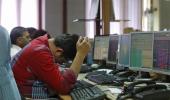'Somebody was using somebody to make statements that will stir the stock market and lead to a surge.'
'A sudden surge and a sudden crash is always an ideal situation for people to make illicit gains and then siphoning off the money.'

E A S Sarma, former secretary to the Government of India in the ministries of power and finance, is known for espousal of causes related public interest and for that he has often crossed swords with the people holding high offices.
On June 6, the former IAS officer known for his integrity, wrote a letter to Economic Affairs Secretary Ajay Seth, demanding an inquiry by the Enforcement Directorate into the June 4 stock market crash that wiped off Rs 30 lakh crore of investors' wealth and sought to know what measures were taken by the Securities and Exchange Board of India, India's equity market regulator, to find out the reason behind the sudden surge in the stock market on June 3 and an equally dramatic crash on June 4 when the election result was announced.
Sarma tells Prasanna D Zore/Rediff.com that he would like to see a thorough investigation into the issue -- the Congress party has demanded the formation of a Joint Parliamentary Committee to investigate the 'biggest stock market scam' -- by the Enforcement Directorate under the supervision of a senior member of the judiciary.
Why are you demanding an inquiry into the stock market crash on June 4 and the huge jump in stock market indices just a day before on June 3 when the markets opened for business after exit polls on June 1? What are you sensing?
What happens is normally when the stock market is very volatile, when it surges and then crashes, it is not just an ordinary crash. It went down by about 6,000 points (on June 4 when the actual votes were counted and it became evident that the actual results were not matching the numbers predicted by exit polls).
Under these circumstances, small investors lose huge money and some of the speculative traders and big investors make money.
In other words, these people who can quickly enter the market and quit and manipulate (the markets) are the people who make profits at the cost of small investors.
Now, the problem in India is earlier these small investors, people who never invested much in equity markets, were coaxed by various governments since the 1991 economic reforms to invest in the stock market. They (successive governments) began disinvesting public sector undertakings, selling public sector shares.
Now take the case of LIC, an organisation run by policyholders' money, a government company that provides social security by way of insurance policies to people across India who pay premiums from their hard earned savings.
When LIC got listed on the stock markets, they induced all the policyholders to invest in its shares. These are the kind of small shareholders who are invested in the stock market today and this kind of wild fluctuation.
(Note: The benchmark BSE Sensex closed at 73,961 points on Friday May 31, a day before the last phase of polling on Saturday June 1 and on which day after 6 pm the exit polls showing the NDA getting anywhere between 350 to 400 seats were made public.)
(When the markets opened for trade on June 3 -- June 1 and 2 were trading holidays -- they opened with a huge gap of more than 2,000 points riding on the exit poll euphoria and finally closed the day up 3.39 per cent or 2,500 points at 76,469.
The Sensex crashed by 4,390 points or 5.7 per cent on June 4 when the BJP (240 seats) and its allies could secure only 290 seats, far less than the 350-400 predicted by exit polls) resulted in stock market investors losing heavily (Rs 30 lakh crore reportedly.)
Now the more important thing is there was an exit opinion poll (on June 1) a few days ago. I don't see any reason why there should be exit polls when there was counting scheduled anyways on June 4. The Election Commission should really ban all these things.
Only big people gain and the small people don't care anyways. There was a big fever built up (on June 3 in the equity markets because of the exit poll predictions). Then suddenly I find that the prime minister says the stock market is going to surge on the fourth (of June; Narendra Modi in an interview with NDTV made this claim on May 19.)
Normally nobody expects a senior public official like the prime minister talk like this when India's problems are poverty, livelihood, inflation, unemployment, shelter or drinking water, their food, and basic requirements. These are the election issues.
I don't know why you should bring in the stock market as if the stock market drives the democracy in India. He made a statement and it was immediately followed by (Union Home Minister) Amit A Shah. He gave some kind of (investing) advice also. That is ridiculous in my view.
They would not have made such statements but for some advice given by some so-called expert from the ministry of finance. If that is the case, one should identify that person and then book him.
If it is an outsider, then who is that outsider? Does he have any link with the pollsters? Does he have any link with some big corporate entities?
Why did they (Modi and Shah) give investing advice? Is there any manipulation through the statements of the prime minister and Amit shah?
Don't forget that India's stock market is manipulated not only domestically but also by outside forces (offshore entities who are legally allowed to buy and sell equity in India).
There is a whole lot of shadow economy outside India and the shell companies are flourishing.
Shell companies as defined in the Companies Act, and the Prevention of Money Laundering Act and Sebi regulations. But very strangely, for the last six-seven years, even though government told Parliament that (thousands of) shell companies (have been identified and closed), these shell companies have not been defined.
OECD has got a definition (for shell companies), the United States has got a definition (for shell companies). They (the Government of India) appointed a task force but they never defined (what a shell company is) and they left a legislative gap, conveniently, for the shadow economy to flourish.
My point is that when stock markets fluctuate so wildly -- huge surges and huge crashes -- is there any money laundering, round tripping happening?
Is there any manipulation of the stock market from inside, outside? These are the issues which have to be investigated thoroughly.
Now who should investigate -- the Enforcement Directorate, CBI, I-T? Are they independent nowadays? People do not have much faith in these institutions these days. What I suggested is that there should be a judicial oversight of such an investigation. That is very necessary.
The Congress has demanded a Joint Parliamentary Committee to probe what it calls Rs 30 lakh crore scam.
That is political. They look at it from the Parliament point of view.
The other thing is we need to find what is the role of Sebi in this/ Sebi (being the stock market regulator) is supposed to look into this (wild stock market fluctuation). The integrity of the stock market is involved.
If the stock market is stable, if the stock market is mature and deep, there is no problem. But if there is a fluctuation they must calm down the markets.
Such fluctuations deplete people's confidence in the stock market. Credibility of the stock market will come down. Why should all this happen?
The most shocking thing is why should the prime minister and home minister of India give investing advice to people.
Do you think the prime minister, the finance minister and the home minister, talking up the market, is an abnormality, an anomaly?
I don't want to make any aspirations on anybody, but the series, the sequence of events, have to be looked into in its totality. Together they contributed to this bloodbath and this possibility of retail investors being robbed.
Today, household savings have come down in India very drastically and their hard earned savings have been invested in the markets and they are being robbed this way.
I work among the slum dwellers, among the tribals and the backward masses. They are not bothered about the stock market. They are struggling to get their drinking water, food on the table and a good house.
But the retail investors have their exposure to the equity markets either directly or through mutual fund investments. The whole thing requires a complete investigation and the government should come clean on this.
I suggest an investigation by the ED or the CBI, but under the oversight of an independent senior member of the judiciary. Otherwise it will not be independent. People will not have confidence in such an investigation.
It's a fact that there was a huge bloodbath in the market (on June 4) and we need a thorough, independent and fair investigation to find out if some big people in India or abroad profited out of it and if these wild fluctuations were purposely engineered to make windfall profits.
Who could be those 'stock market sharks' who profited from the surge and fall on June 3 and 4 at the cost of retail investors?
I don't want to mention names, but in our domestic and external shadow economy, there are many, many, people who are operating and they not only round trip money, avoid taxes, but they also manipulate the stock market to their advantage and create illicit wealth. They park it outside. Everybody knows that.
So they (the Sebi, ED or the CBI) should look into the actual transactions (the trades that took place in the equity markets on May 30, 31 and June 3 and 4).
We should very carefully look into insider trading charges by people in high positions.
I believe there were very hectic (trading) activity (in Indian equity market) even on (May) 30th, 31st and all that (June 3 and 4). Sebi should get involved and take measures not to allow such a thing to happen again.

Are you saying that the prime minister and home minister could have indulged in insider trading?
No, no. I would say that the prime minister, home minister should keep away from such statements. They are imprudent, indiscreet and ill-timed. They should never talk about it. I remember when Dr Manmohan Singh was the finance minister he said, 'I will not lose sleep on what happens in the stock market.'
And the prime minister and home minister talking about the market is unprecedented. That's unfortunate. Again I don't want to attribute motives to anybody because unless an investigation is done, a thorough investigation and independent investigation that inspires public confidence, we wouldn't know the facts.
As of June 6, the Sensex has regained almost all its losses that it suffered on June 4. On June 4 it had scaled a peak of 76,450 and on June 6 the benchmark is closer to 75,000. Would retail investors still be making losses?
Just because that has happened (Sensex has scaled back above the May 31 level of 73,960) doesn't mean all retail investors would have recouped their losses. The retail investors' money is gone (as they might have sold, what they bought on June 3, when the markets began to tumble on June 4 in the expectation that markets would continue to surge in the days and months after June 4 because that is what the prime minister and home minister alluded to).
Where is it that profit parked? Is it in India or outside? In what instruments (have they been laundered into)? Is it in real estate or outside overseas accounts? Illicit accounts? This has to be looked into.
What questions do statements that came from the prime minister and home minister raise about the credibility of the government and the credibility of people who hold high offices?
I think basically we are more worried about the credibility of the stock market.
Politicians should not talk about the stock market in public speeches. They can have a discussion privately, but they should not give public speeches because their word carries a lot of weight. And people, they just follow that blindly. That is not correct.
In any other mature equity market, a head of the government talking up the market could have been immediately rebutted by the market regulator.
Do you think the Sebi should have done that as soon as the prime minister said that the stock market will break records on June 4 in his May 19 interview?
I saw some reports even before all this crash and all that the Sebi was expecting a crisis and they were preparing for crisis management. That means there is some discussion that they anticipated (this crazy volatility).
During every election there will be little fluctuation. You should contain it. Sebi's role is to ensure that the stock market integrity is maintained. To that extent they should certainly look at the role played by the (people holding high government positions) during that time (May 30 to June 4) and then determine what Sebi should do in future.
If at all a Sebi or an ED investigation is announced, what should be the focus of such an investment?
I have raised some important questions in my letter (to the economic affairs secretary).
- I asked, basically, whether the prime minister and home minister got the inputs from within the finance ministry or from outside, and who are the outside agencies?
- Is there any money laundering link and is there any manipulation of the stock market?
- What are the gains? What are the losses? Who lost and who gained?
- Was there any insider trading in the whole thing?
Somebody was using somebody to make statements that will stir the stock market and lead to a surge. A sudden surge and a sudden crash is always an ideal situation for people to make illicit gains and then siphoning off the money.












 © 2025
© 2025